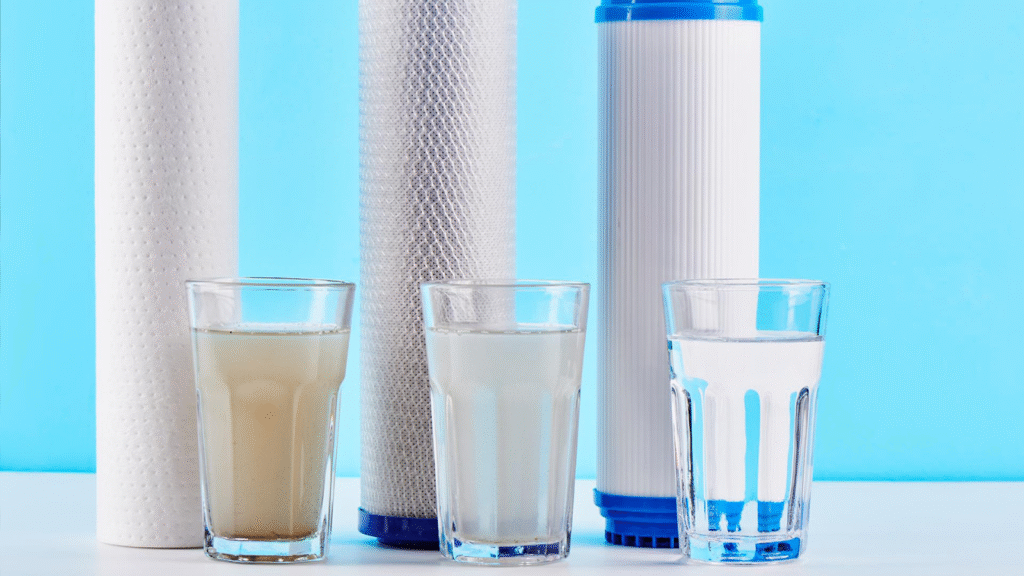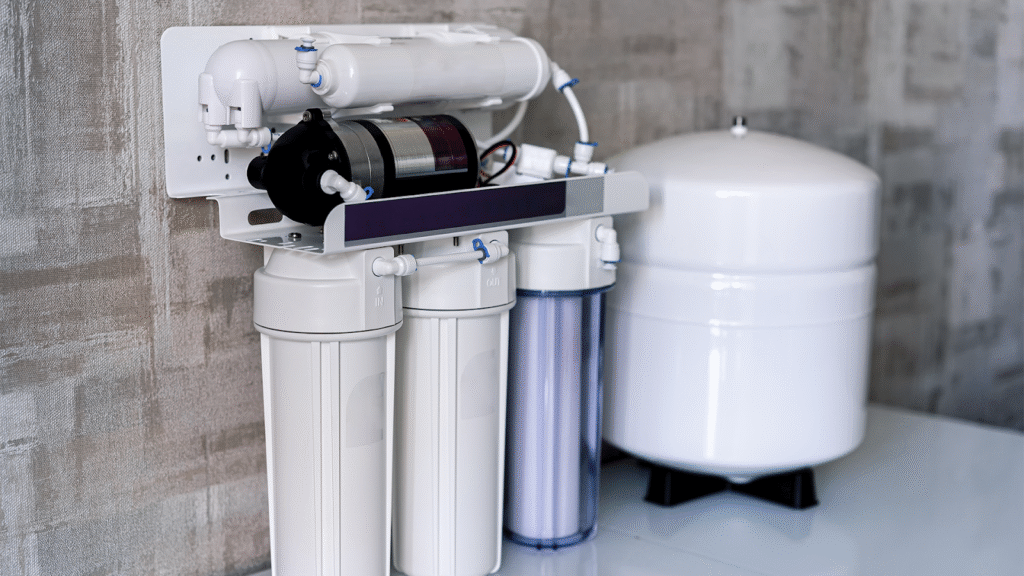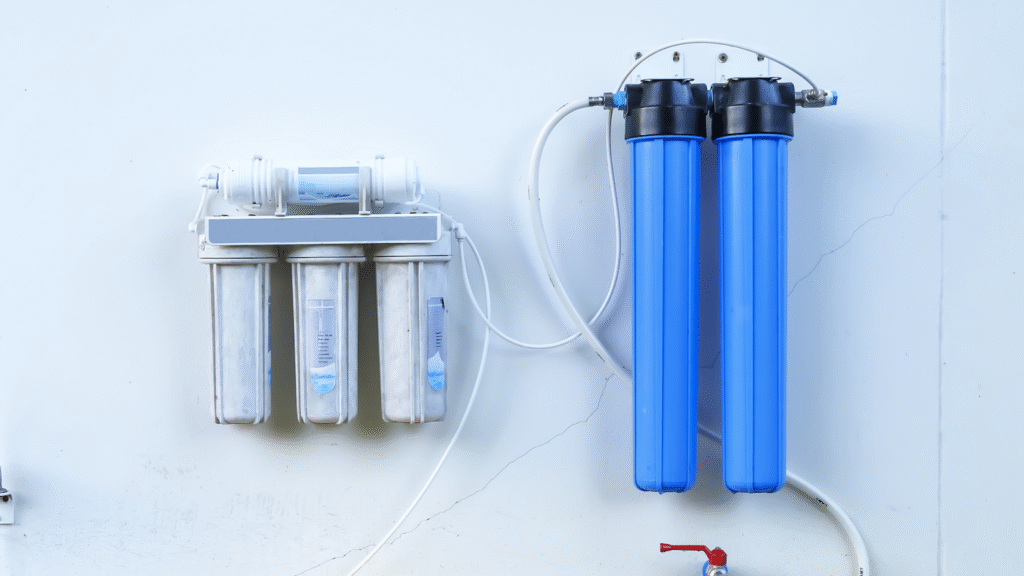If you’re an Edmonton homeowner tired of battling stubborn limescale, scratchy laundry, or shortened appliance life, you’re not alone. Hard water is a daily nuisance in this city—thanks to mineral-rich water drawn from the North Saskatchewan River. According to EPCOR, the water in Edmonton averages 165 mg/L of calcium carbonate, placing it in the “hard” category.
So what’s the best solution? You’ve likely heard of salt-based and salt-free water softeners, but which one makes sense for your home?
This blog offers an unbiased, research-backed breakdown of the pros, cons, and realities of salt vs. salt-free softeners in Edmonton, so you can make a confident, informed decision for your water, your appliances, and your family.
Table of Contents
ToggleUnderstanding Hard Water in Edmonton
Hard water isn’t dangerous, but it is damaging. The high levels of calcium and magnesium present in Edmonton’s tap water lead to:
- Mineral buildup in pipes and appliances
- Reduced water heater efficiency
- Dull, stiff laundry and spotty dishes
- Dry, irritated skin and brittle hair
Over time, this can cost you hundreds, even thousands, in utility bills, appliance repairs, and cleaning products.
How do we combat it? That’s where water softeners come in.
What is a Salt-Based Water Softener?
Salt-based water softeners use a process called ion exchange to remove hardness minerals from your water physically.
How it works:
- Water flows through a resin bed charged with sodium (or potassium) ions.
- Calcium and magnesium ions swap places with sodium ions.
- The hardness minerals are trapped in the resin and later flushed away during a regeneration cycle.
Key benefits:
- True softening: Hardness minerals are removed, not just altered.
- Proven effectiveness: Works exceptionally well in high-hardness areas like Edmonton.
- Appliance protection: Extends the life of dishwashers, water heaters, etc.
Limitations:
- Requires regular salt refills
- Produces some wastewater during regeneration
- May slightly increase sodium levels in water (typically negligible)
Learn more about TAC systems in our blog on Template-Assisted Crystallization (TAC) Systems
What is a Salt-Free Water Softener?
Also called “conditioners,” salt-free water softeners use technologies like Template Assisted Crystallization (TAC) to alter the structure of calcium and magnesium ions, preventing them from sticking to surfaces.
How it works:
- Water passes through a medium that crystallizes hard minerals.
- These micro-crystals remain suspended in water and don’t cling to pipes or surfaces.
Key benefits:
- No salt or brine discharge
- Low maintenance
- Eco-friendly and septic-safe
- Doesn’t add sodium to your water
Limitations:
- Doesn’t actually remove hardness minerals
- Less effective for extremely hard water (like Edmonton)
- Won’t prevent spotting or soap scum as well as salt-based systems
Performance Comparison in Edmonton Conditions
| Feature | Salt-Based Softener | Salt-Free Conditioner |
| Removes Hardness Minerals | ✅ Yes | ❌ No |
| Prevents Scale Buildup | ✅ Yes | ✅ Yes (moderately) |
| Effective in High Hardness | ✅ Yes (ideal for Edmonton) | ❌ Not recommended |
| Sodium-Free | ❌ No (adds small amount) | ✅ Yes |
| Maintenance Required | ✅ Salt refills + annual check | ✅ Minimal |
| Septic System Friendly | ❌ Depends on discharge setup | ✅ Yes |
Health & Environmental Considerations
- Sodium in Softened Water Salt-based softeners add a small amount of sodium to water—typically around 7.5 mg per liter for water with 10 GPG hardness. That’s far less than what you’d get from a slice of bread, but individuals on strict low-sodium diets may want to:
- Use potassium chloride instead of salt (more expensive)
- Install a separate RO system for drinking water
- Wastewater Impact Regeneration cycles discharge salt water into the drain, which may not be ideal for septic systems or eco-sensitive areas. However, modern systems are more efficient and only regenerate as needed.
- Eco-Friendliness Salt-free conditioners are praised for being low-waste and low-energy. But their limited ability to remove hardness may still result in scale buildup, requiring more cleaning agents and energy over time.
Real Homeowner Needs: Choosing Based on Lifestyle
Here’s how to determine what works for your home:
Go Salt-Based If:
- You live in Edmonton (hard water > 160 mg/L)
- You want real mineral removal
- You have expensive appliances or plumbing upgrades to protect
Go Salt-Free If:
- You have moderately hard water (<120 mg/L in other areas)
- You want a low-maintenance, eco-friendly option
- You’re on a septic system or restricted-sodium diet
For most Edmonton households, a salt-based softener will deliver the best long-term value.
Costs & Maintenance: Salt vs Salt-Free
| Factor | Salt-Based System | Salt-Free System |
| Initial Equipment Cost | $1,000 – $2,500 | $1,000 – $2,000 |
| Installation | $300 – $600 | $300 – $500 |
| Annual Maintenance | ~$150 – $250 (salt + check) | ~$50 – $100 (media replace) |
| Lifespan | 10–15 years | 6–8 years |
While salt-free units seem easier, they often require media replacement and may not handle Edmonton’s high mineral load effectively—leading to indirect costs like appliance wear.
What Local Experts Recommend
Most licensed plumbers and water treatment specialists in Edmonton, like Water Softener Edmonton, favor salt-based systems, particularly brands like Fleck, Clack, or GE with metered control valves. These offer the best protection for:
- Water heaters
- Washing machines
- Dishwashers
- Tankless heating systems
Local experts also recommend testing your water every 1–2 years, even with a softener installed.
Add-Ons for Maximum Effectiveness
If you install a water softener in Edmonton, consider pairing it with:
- Sediment Pre-Filter: Prevents rust/sand from clogging your softener
- Carbon Filter: Removes chlorine, improves taste
- RO System: For perfectly pure drinking water
Final Verdict: The Right Choice for Edmonton
When it comes to salt vs. salt-free softeners in Edmonton, the science and local conditions point to a clear winner:
Salt-based systems offer real mineral removal, proven protection, and greater reliability in hard water conditions.
Salt-free systems are a solid option in areas with moderate water hardness or for homeowners prioritizing low maintenance and environmental concerns. But in Edmonton, their benefits are often outweighed by performance limitations.
Choosing a water softener is a home investment.
The wrong choice could mean continued limescale, higher energy bills, and premature appliance wear. The right system, however, can transform your water quality, reduce maintenance, and protect your home for years to come.
At Water Softener Edmonton, we help homeowners navigate these choices with honesty, science, and real local experience.
Call us today for a free water test, and let’s find the system that’s right for you.




